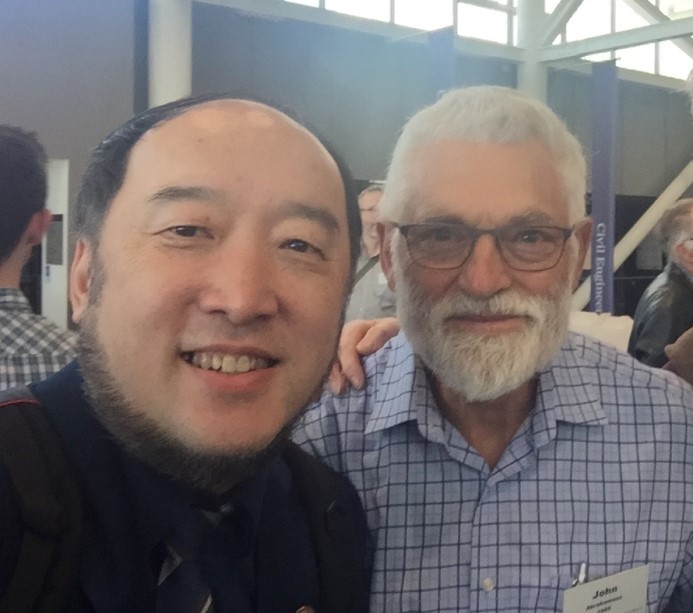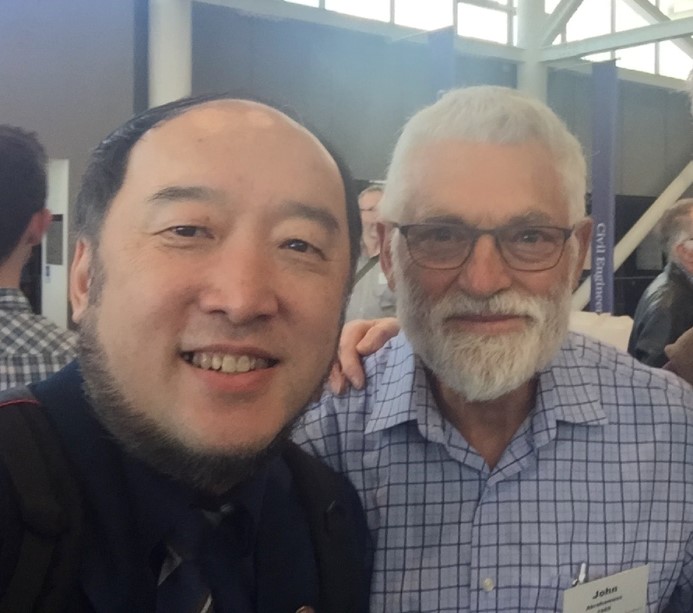2019年2月11日,受新西兰奥克兰大学和澳大利亚蒙纳士大学的邀请,陈晓东院士作了主题为“生活质量工程(LQE)包含了食品实践-为什么,如何做和未来的前景?”的学术报告,他提倡将生活质量(LQ)作为人类的主要驱动力之一与产业产品开发的明确目标之一,可以将化学反应器工程基础概念视为行为分析的一个实际框架。 奥克兰大学是新西兰最大的一所从事教学研究且拥有最多专业的综合性大学,综合排名常年位居新西兰第一,是一所国际顶尖的研究型大学之一。蒙纳士大学是澳大利亚顶尖学府之一,是澳大利亚名校联盟的“八大名校”里规模最大的一所学校,化学工程在全球QS榜上长期排名20-25名。 在他的报告中,解释了“不断发展”的化学工程领域所进行的研究,这个研究的内容可以从非常具体全面的角度来理解。随着老龄化社会问题越来越突出,如日益增大的糖尿病患者人群,人们在维持LQ方面面临着巨大挑战。瞬息万变的世界,使得化学工程变得更加多学科交叉和多尺度横跨,比如食品的工业加工、体内和体外过程都必须对各种相互作用有系统的理解。化学工程原理在生活质量(LQ)中的应用和扩展是令人着迷的一个大领域,其未来的前景也会越来越广阔。 在去奥克兰大学之前,陈院士还受邀参加了一个在坎特伯雷(Canterbury)大学的关于化工教育2030的研讨会。参加这个研讨会包括了长期在新西兰国内国际企业与高校,科研院所工作的人员。
陈院士与他的博士导师之一,已从坎特伯雷大学化工系退休的Abrahamson博士。Abrahamson博士已被公认为最早报导实验室产出的纳米碳管的科学家,同时也是国际公认的球放电现象的权威。
| In February 2019, Professor Xiao Dong Chen was invited by the University of Auckland, New Zealand and Monash University, Australia, to deliver public lectures. He gave the seminars entitled as "Life Quality Engineering (LQE) Encapsulating Food Practices - Why, How and Future Prospects"? In proposing LQ as one of the main driving forces for humanity, chemical reactor engineering can be seen as a solid framework for behavioral ****yses. The University of Auckland is New Zealand's largest comprehensive university with a wide range of teaching and research activities. It ranks first in New Zealand and is one of the top research universities in the world. Monash University is one of the top universities in Australia. It is the largest of the top eight universities in Australia. The chemical engineering department ranks 20-25 on the Global QS list. In this talk, a path taken by an ‘ever’ evolving chemical engineer is explained. The research and development as a result of this path can be seen from being very specific to be more comprehensive. Meeting the grand challenges in the improvement and maintenance of Life Quality (LQ) in an aging society (with more diabetic populations for instance) yet in a fast changing world, chemical engineering becomes even more multidisciplinary and multi-scaled. Industrial processing, in vivo and in vitro processes all have to be understood interactively and systematically. In proposing LQ as one of the main driving forces for humanity, chemical reactor engineering can be seen as a solid framework for behavioral ****yses. Applications and extensions of chemical engineering principles in LQ are fascinating and the prospects for future are ever broadening. Finally, if time allows, a new approach to engineering turbulence ****ysis will also be talked about only for fun. Before going to the University of Auckland, Professor Xiao Dong Chen was also invited to participate in a workshop on Chemical Engineering Education 2030 at the University of Canterbury. Participation in this meeting included senior management working in New Zealand's domestic and international companies, as well as academics in universities and research institutes.
Professor Xiao Dong Chen and one of his PhD supervisors Dr. Abrahamson, who has already retired from the Department of Chemical Engineering at the University of Canterbury. Dr. Abrahamson has been recognized as one of the first scientists to report carbon nanotubes produced in laboratories, and he is also an internationally recognized authority on ball lightening phenomena.
|


